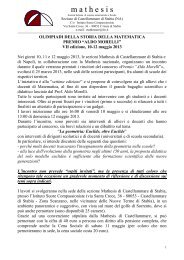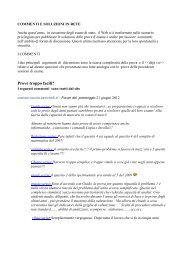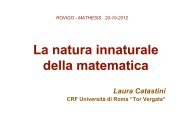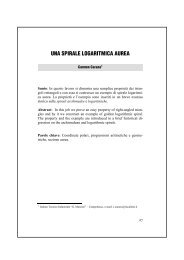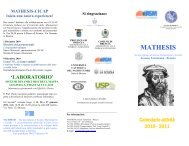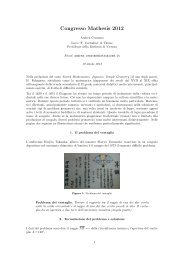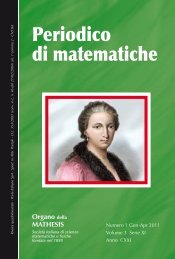Periodico di matematiche - Mathesis
Periodico di matematiche - Mathesis
Periodico di matematiche - Mathesis
You also want an ePaper? Increase the reach of your titles
YUMPU automatically turns print PDFs into web optimized ePapers that Google loves.
✐<br />
✐<br />
Una lezione inusuale sul tempo<br />
la percezione umanistica incontra la scienza<br />
Domenico Liguori, Tina Reo<br />
Abstract: What’s time? This and many other reflections have given the cue to an unusual lesson,<br />
addressed to two second classes of the “Liceo Scientifico” of Cariati (CS), in the school-year 2009/10.<br />
The lesson, alternative towards a tra<strong>di</strong>tional way of teaching, has involved, in a acquainted and inter<strong>di</strong>sciplinary<br />
way, a Mathematics and Physics teacher, an Italian Letters teacher and the two parallel classes.<br />
Through brain storming, critical analysis of passages from novels or from literature stu<strong>di</strong>ed at school,<br />
funny and amusing physical experiments the students, as true actors, have asked themselves questions<br />
about “the concept of time” experimenting with its subjective psychological perception and its objective<br />
scientific relativity.<br />
“Non ho tempo!”<br />
Chissà quante volte o sarà capitato <strong>di</strong> ascoltare questa espressione o l’abbiamo<br />
pronunciata noi stessi. Tante volte nominiamo la parola “tempo”, utilizziamo il tempo<br />
e viviamo in stretta relazione con esso ed in esso, ne facciamo esperienza <strong>di</strong> misura<br />
tutti quanti eppure, probabilmente, l’idea, il significato o il concetto stesso implicito<br />
nella parola, assumono sfumature <strong>di</strong>verse ed imprecise, mettendoci in imbarazzo <strong>di</strong><br />
fronte al tentativo <strong>di</strong> volerne parlare.<br />
«Che cos’è dunque il tempo? Se nessuno me lo chiede, lo so; se voglio spiegarlo<br />
a chi me lo chiede, non lo so più». Così si esprimeva, a riguardo del tempo,<br />
Sant’Agostino nelle Confessioni.<br />
Che cos’è il tempo? Quanti tempi esistono? Il tempo è uguale o scorre allo stesso<br />
modo per tutti? Come percepiamo e misuriamo il tempo? Sono domande fondamentali<br />
quando si inizia a parlare del tempo. Non sempre è possibile giungere a risposte o<br />
verità oggettive, ma dal punto <strong>di</strong> vista della ricerca (ed anche <strong>di</strong> quella <strong>di</strong>dattica), è più<br />
importante porsi delle domande ed imparare ad interrogarsi stimolando la curiosità<br />
ed il senso critico-logico, che trovare o fornire risposte già preconfezionate da far<br />
accettare agli alunni come “verità assolute” o dettami <strong>di</strong> un “ipse <strong>di</strong>xit”.<br />
Lo stesso Einstein, padre <strong>di</strong> una nuova concezione del tempo, alla richiesta <strong>di</strong><br />
spiegazioni sulla relatività rispondeva con un esempio illuminante: “quando un uomo<br />
siede per un’ora in compagnia <strong>di</strong> una bella ragazza, ha l’impressione che sia passato<br />
un minuto. Ma fatelo sedere su una stufa per un minuto e gli sembrerà più lungo <strong>di</strong><br />
qualsiasi ora. Questa è la relatività”.<br />
81<br />
81



